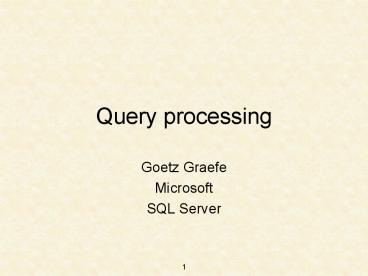Query processing - PowerPoint PPT Presentation
1 / 15
Title:
Query processing
Description:
Many university and industry research projects. Asia, Europe, Americas ... Duality of sorting and hashing. Survey of query evaluation techniques. Post-Volcano ... – PowerPoint PPT presentation
Number of Views:189
Avg rating:3.0/5.0
Title: Query processing
1
Query processing
- Goetz Graefe
- Microsoft
- SQL Server
2
Volcano optimization
- Many university and industry research projects
- Asia, Europe, Americas
- Red Brick
- Dynamic query execution plans
- EROC/NEATO
- Teradata
- Cascades
- Tandem
- Microsoft SQL Server
3
Volcano Extensible optimization
- Optimizer generator ICDE 1993
- Search strategy Bill McKenna
- Open OODB with José Blakeley
- Choose plan operation Karen Ward
- Dynamic execution plans Rick Cole
- Scientific queries Richard Wolniewicz
4
Volcano Parallel execution
- Exchange operation SIGMOD 1990
- Hierarchical hardware Diane Davison
- Bottom-up scheduling for Informix
- Resource management Diane Davison
- Complex object assembly with David Maier and
Tom Keller - Parallel sorting
- Guided hash join with Henry Bremers
- Duality of sorting and hashing
- Survey of query evaluation techniques
5
Post-Volcano
- Cascades query optimizer
- Hash joins and hash teams
- Replicate advantage of interesting orderings
- B-tree indexes
- CPU caches
- Sorting with runs in a partitioned B-tree
- Incremental index operations using control tables
- Indexing and caching in nested iteration
- Write-optimized (log-structured) B-trees
- Locking and logging in indexed group-by views
6
My current work
- Ship SQL Server 2005
- Manage 35 development engineers
- Query execution, plan caching
- XML data type, XML indexing, XQuery execution
- T-SQL execution, CLR hosting
- Future of SQL Server extensibility
- Index operations including sorting
- Robust execution, graceful degradation
- Miscellaneous data structure ideas
- Max-diff histograms, order-preserving compression
7
Promising research topics
- Plan caching
- Memory management, plan fragments
- Parameterized queries and plans
- Policies for histograms and other statistics
- Sampling, re-sampling thresholds
- Replacement versus adding, incremental
maintenance - Relationship to materialized and indexed views
- Feedback and learning
- Recompilation policies and mechanisms
- Plan fragments, e.g., cascading updates
8
Promising research topics
- Resource management within plans
- Mechanisms, e.g., dynamic bitmaps
- Policies, e.g., LRU of waiting memory
- Memory for bitmaps and exchange
- Nested iteration
- Nested iteration
- Index navigation, index optimizations
- Cost calculation of buffer effects
- Caching of inner results, use of merged indexes
- Dynamic query execution plans for nested
iteration - Merging plan caching and data caching
9
Promising research topics
- Soft indexes, self-tuning
- Auto-grow, auto-shrink, auto-reorganization
- Incremental materialization, control tables
- Streams
- Recovery log, replication log, error log
- Audit log, event log, tracing
- Performance counters, monitoring, notifications
- Bulk import, bulk update, cascading change
- Queues of user work and system work
- Tables and indexes as halted streams
- Streams as implementation basis for grid
databases
10
Storage engine interactions
- Merry-go-round (shared) scans
- Plan choices by buffer pool contents
- Plan choices by availability
- Cost of isolation levels
- Access or reconstruction of prior versions
- Consistency among indexes
- Clustered and non-clustered indexes
- Multiple non-clustered indexes
- Indexes on views
- Correctness of optimization rules
- Join elimination, view substitution
11
Optimizer quality assurance
- Daily regression testing is the easy part
- Primitives for cardinality estimation and cost
calculation - Key issue how to test an AI system?
- Also database tuning advisor
- Graceful transition between alternatives
- All queries and plans
- Even after errors in cardinality estimation
12
Reducing complexity
- Code volume and maintenance cost
- Threshold of multiplying redundancy
- Supportability and user education
- Major costs for vendors and users
- Focus on orders-of-magnitude and on factors
- Avoid complexity for percentage improvements
- Peak versus dependable performance
- Cost containment versus risk management
13
Reducing code volume
- B-trees for all storage
- Clustered and non-clustered indexes
- Indexes on hash values and Z-order
- Temporary storage for sorting and cursors
- Materialized and indexed views, no histograms
- Large objects and cursor positioning
- Large in-memory data structures?
- One join but with graceful degradation
- Fewer optimizer choices and fewer mistakes
- Fewer transaction isolation levels
- Serializability, traditional or using snapshots
14
Why are we failing to capture the other 85 of
data?
- We have yet to master traditional databases
- Zero administration, zero knobs, zero data loss
- Self-tuning better than any DBA
- 100 application availability upgrades,
failures, tuning, redundancy, etc. - Language syntax and semantics, DDL and DML
- The real answer may be interoperability
- Complete storage unification may never happen
- Sociological arguments for separate stores
15
Whats keeping me up at night
- Am I doing enough to grow my engineers?
- Am I doing enough technical research?
- Who will build the first storage toolkit good
enough for the other 85? - Simple enough to use and to maintain
- Dependable in performance and availability
- Extensible as a toolkit
- Truly disrupting the traditional database market































